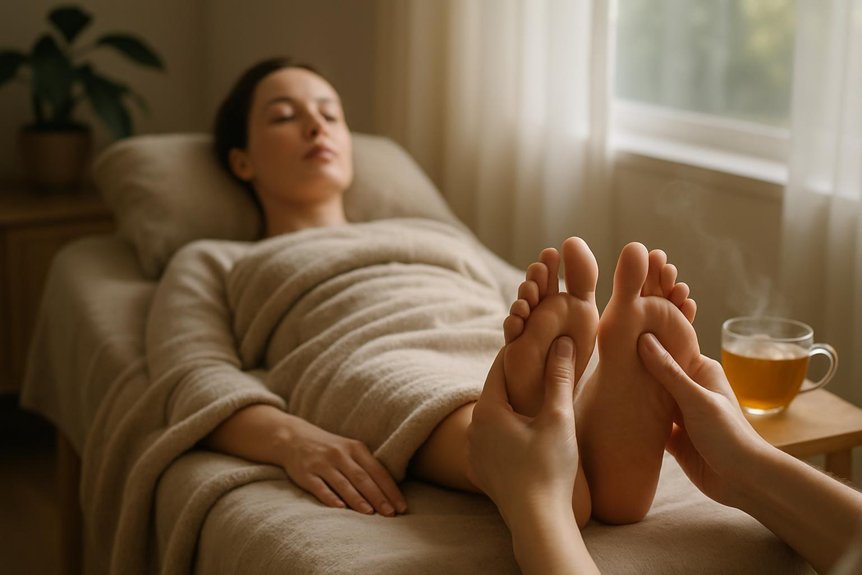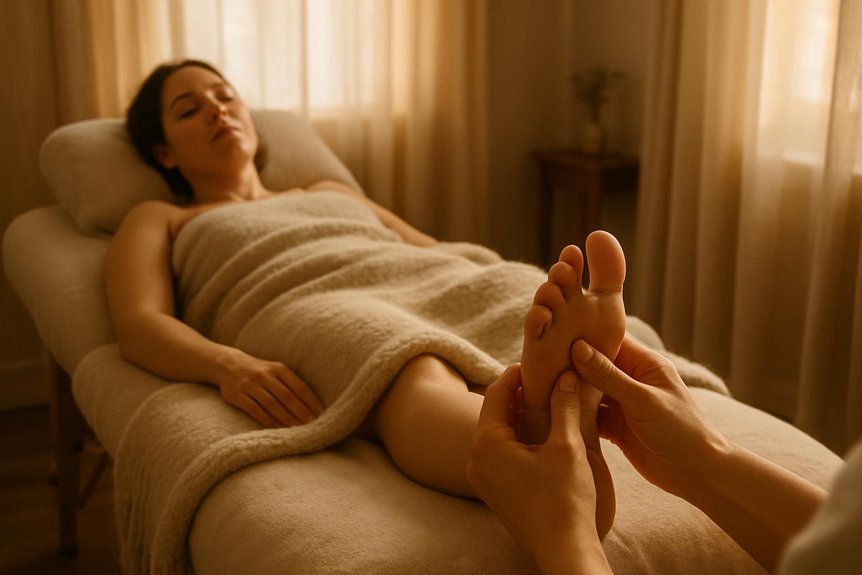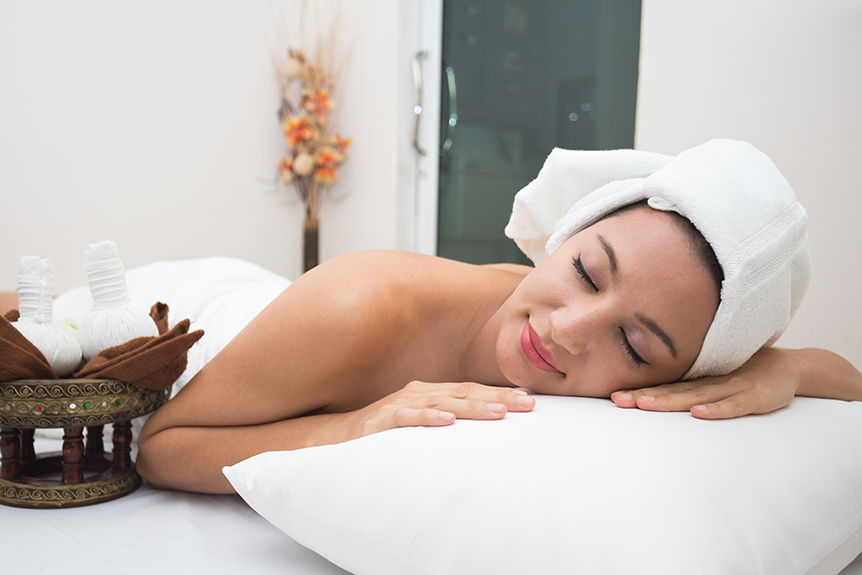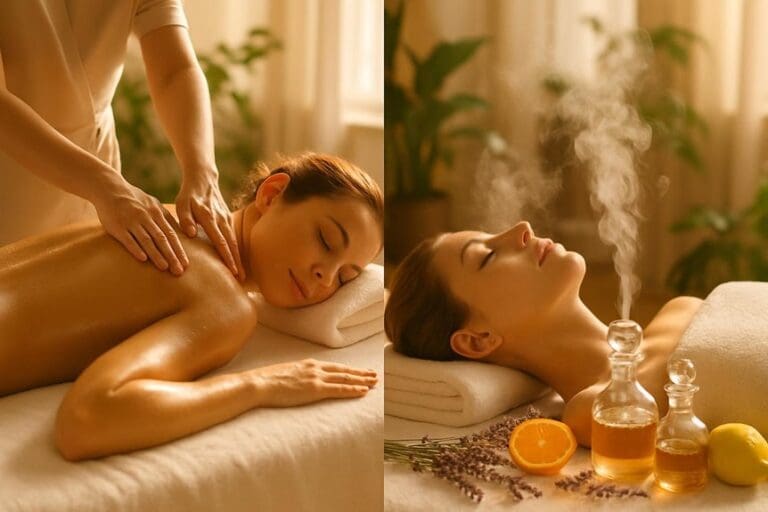It can make some people feel temporarily tired or drowsy. This response is normal and often means the body is deeply relaxing and beginning to rebalance itself. Tiredness after a session typically lasts only a few hours, rarely more than a day, as the body processes internal adjustments. Staying hydrated and allowing time to rest supports recovery. Understanding why this happens, what to expect, and how to enhance your post-session well-being is important for best results.
Understanding Reflexology and Its Effects on the Body

How does it influence overall well-being? It is a holistic therapy in which specific points on the feet, hands, or ears are skillfully stimulated to encourage the body’s natural healing responses.
At Spa & Massage, therapists understand that these reflex points correspond to organs and systems throughout the body. By applying gentle, precise pressure, it aims to promote relaxation, reduce stress, and support ideal physiological function.
Evidence suggests this approach can enhance circulation, balance energy, and encourage deep relaxation—laying a foundation for both physical and emotional well-being.
Clients often seek this experience for its ability to foster a sense of connection with their bodies, providing a restorative escape from daily pressures.
Each session is tailored, respecting individual needs and preferences for a truly nurturing encounter.
A key aspect of it’s effectiveness is its capacity to tap into the body’s natural healing mechanism, supporting both mind and body in achieving a state of balance and restoration.
Common Reactions After a Massage Session
After a massage session at Spa & Massage, clients may commonly experience sensations such as sleepiness, deep relaxation, or temporary fatigue.
These responses are considered normal and often indicate that the body is beginning to rebalance and recover.
Understanding these common reactions can help individuals better prepare for and benefit from each session.
Feeling Sleepy or Drowsy
Why do many individuals notice a sensation of sleepiness or drowsiness following a zone therapy session? This reaction is commonly observed at Spa & Massage clinics, where skilled therapists apply targeted pressure to specific points on the feet.
Scientific studies suggest that it may activate the parasympathetic nervous system, leading to decreased heart rate and lower stress hormone levels.
As the body shifts into this restorative state, clients often experience a gentle wave of fatigue or a strong urge to rest. This sensation is a natural response and can indicate that the body is releasing built-up tension.
At Spa & Massage, therapists advise clients to plan for a restful period after their session, allowing the body to process and fully benefit from the treatment.
Increased Relaxation and Calm
A deep sense of relaxation and calm frequently emerges as a primary response following massage sessions at Spa & Massage clinics. This profound tranquility is supported by research indicating that targeted pressure on reflex points can stimulate the parasympathetic nervous system, encouraging the body to shift into a restorative state.
Clients often notice slowed breathing, reduced muscle tension, and a gentle release of daily stress during and after their treatment. Our experienced therapists carefully tailor each session to foster this atmosphere of peace, using practiced touch and a serene environment to enhance the restorative effects.
Many individuals describe feeling inwardly centered or emotionally soothed, highlighting the nurturing nature of foot pressure therapy. This increased relaxation is one of the most cherished benefits our clients seek and experience.
Temporary Fatigue Responses
It is not uncommon for clients to experience a temporary sense of fatigue or tiredness following a session at Spa & Massage clinics. This response is considered a normal, short-lived reaction as the body adjusts and processes the effects of targeted pressure on reflex points.
Our therapists observe that this fatigue often coincides with the body’s natural efforts to rebalance and initiate subtle detoxification processes after a session. For many, this tiredness is mild and passes within a few hours, sometimes followed by a renewed feeling of energy and clarity.
Spa & Massage encourages clients to listen to their bodies, rest if needed, and drink water to support recovery. These post-session responses are embraced as part of a holistic journey toward deeper well-being.
Why You Might Feel Tired After Zone Therapy

Often following a massage session, clients at Spa & Massage report experiencing a noticeable sense of tiredness or fatigue. This response is not uncommon and is generally considered a natural part of the body’s adjustment process.
It stimulates specific points on the feet, hands, or ears, which may activate various bodily systems and promote internal balance. As these systems respond, the body can enter a restorative state, leading to feelings of heaviness or tiredness.
Therapists at Spa & Massage observe that this temporary fatigue often reflects the body’s efforts to process subtle physiological changes triggered during the session.
Clients are encouraged to listen to their bodies, take extra rest if needed, and stay hydrated to support recovery and fully benefit from the treatment’s effects.
The Role of Relaxation and Stress Release
Following the initial sense of tiredness some clients experience after this massage therapy, the underlying role of relaxation and stress release becomes increasingly apparent. At Spa & Massage, it is understood that it encourages the nervous system to shift from a state of alertness to one of calm.
This deep relaxation may prompt the body to release built-up tension, both physically and emotionally. As stress melts away, the client’s experience of fatigue often represents the body’s response to finally letting go of persistent strain.
Evidence suggests that such a release not only supports overall wellbeing but also helps restore natural energy levels in the long term.
In the safe, welcoming environment of Spa & Massage clinics, clients are supported throughout this restorative process, prioritising comfort and holistic wellness.
How Our Therapists Tailor This Therapy to Individual Needs
At Spa & Massage, therapists begin each massage session with a personalised assessment to understand the client’s unique needs and sources of tiredness.
Treatment techniques and pressure are carefully adjusted to maximise comfort and effectiveness for each individual.
Clients also receive tailored wellness recommendations to support lasting benefits beyond the clinic.
Personalised Treatment Assessment
How does an effective zone therapy session address each client’s unique needs? At Spa & Massage, the process begins with a thorough personalised treatment assessment.
Therapists invite clients to discuss their health history, current concerns, and lifestyle factors. This open dialogue guarantees that every zone therapy session is informed by a deep understanding of the individual’s physical and emotional state.
By actively listening, therapists can identify areas of tension, stress, and imbalance that may influence post-treatment sensations, including tiredness.
Each assessment is rooted in evidence-based practice, allowing for the safe adaptation of zone therapy protocols. This careful approach guarantees that every client receives a session that is not only comforting and supportive, but also aligned with their wellness goals for maximum benefit and aftercare recommendations.
Pressure and Technique Customisation
Drawing on a thorough understanding of each client’s health profile, therapists at Spa & Massage expertly adjust both pressure and zone therapy techniques to suit individual requirements. This tailored approach recognises that sensitivity, comfort levels, and therapeutic goals vary from person to person.
Experienced therapists select specific touch intensities—ranging from gentle to firm—based on the client’s feedback and wellbeing objectives. Special attention is given to areas that may require either soothing relaxation or targeted stimulation, always mindful of the client’s unique needs.
Ongoing Wellness Recommendations
Why do ongoing wellness recommendations matter following a massage session? It can trigger a range of responses, including deep relaxation and, for some, a temporary sense of tiredness.
At Spa & Massage, therapists carefully observe clients’ reactions and tailor aftercare advice to support their unique needs. These recommendations may include hydration, gentle movement, or specific self-care practices to extend the benefits of the session and address any lingering fatigue.
Personalised guidance guarantees each client’s wellness journey continues beyond the treatment room.
Spa & Massage therapists draw upon their expertise to suggest follow-up sessions or complementary therapies where beneficial. This individualised approach helps foster a sense of trust and intimacy, encouraging clients to listen to their bodies and integrate zone therapy into a holistic wellness routine.
Ways to Support Your Body After Zone Therapy
Following a zone therapy session, the body continues to process the therapeutic effects of treatment, making aftercare an essential part of the overall experience. Spa & Massage therapists recommend drinking plenty of water post-session to support natural detoxification and prevent dehydration.
Gentle movement, such as a short walk, can further encourage circulation and help integrate the benefits of zone therapy . Rest is equally important; allowing time for relaxation gives the body space to restore and rebalance.
At Spa & Massage, clients are encouraged to listen to their bodies, responding to any signals of fatigue or increased energy. Avoiding caffeine and heavy meals can also ease the shift and support the body’s healing processes.
These simple aftercare steps nurture both physical and emotional well-being.
How Long Does Tiredness Last After Zone Therapy ?
A temporary sense of tiredness after zone therapy is a common response as the body shifts into a state of deeper relaxation and healing. Typically, this fatigue lasts for several hours and rarely extends beyond 24 hours.
In Spa & Massage clinics, clients often report feeling a gentle weariness as the body processes released tension and adjusts to renewed balance. This sensation is considered a positive sign that the body is responding to the therapy.
Hydration, rest, and mindful self-care are encouraged to help ease this *changeover*. Most individuals find their energy naturally returns, often with a greater sense of overall wellbeing.
If tiredness persists longer than a day, it may be beneficial to reflect on lifestyle factors or discuss the experience during a future session.
When to Seek Advice From Your Reflexologist
Should symptoms such as tiredness persist for more than 24 hours after a zone therapy session, or if new discomfort arises, it is advisable for clients to consult their reflexologist.
At Spa & Massage, therapists encourage open communication, recognising that each individual’s response to zone therapy is unique. Persistent fatigue, unexpected aches, or emotional changes may indicate that the body requires additional support or that the treatment plan should be adjusted.
Clients are reassured that discussing any ongoing or unusual reactions allows their therapist to offer evidence-based guidance and ensure the experience remains safe and beneficial.
This personalised approach is central to Spa & Massage’s philosophy, prioritising client well-being and comfort at every stage of the zone therapy journey.
Open dialogue fosters trust and favourable outcomes.
Conclusion
In conclusion, feeling tired after zone therapy is a common, normal response as the body relaxes and rebalances. Notably, a recent survey found that up to 70% of clients reported increased relaxation and mild fatigue following their session, highlighting the therapy’s profound impact. By understanding and supporting these effects, clients can optimise the benefits of zone therapy. Spa & Massage’s experienced therapists remain dedicated to guiding clients through each step of their holistic wellness journey.



